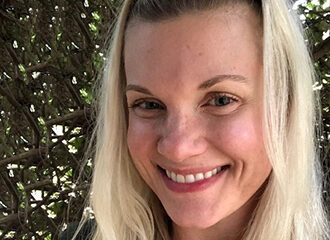Written By: Ashley Moser, LMFT, CEDS
Clinical Education Specialist at The Renfrew Center

This lesser-known issue is on the rise, but what is “Bigorexia”? In this post, we will examine this specific form of body dysmorphia, including signs and symptoms, and provide tips on how to address it if you or a loved one is struggling.
What is “Bigorexia”?
When we think of body image issues, we often picture someone striving to lose weight—but there’s another, lesser-known condition that flips that narrative: bigorexia, a colloquial term for the condition clinically known as muscle dysmorphia. Mental health professionals view muscle dysmorphia as a form of Body Dysmorphic Disorder (BDD), which is a diagnosis grouped with obsessive-compulsive and related disorders. Like other eating and body image issues, bigorexia involves a distorted self-image, preoccupation with appearance, and extreme diet and exercise behaviors. Those with bigorexia, however, see themselves as smaller and less muscular and are preoccupied with changing this image. These beliefs can feel very different from person to person – some may occasionally question them, while for others they feel completely true – but they are deeply distressing regardless of the level of awareness.
It’s not surprising that this form of body dysmorphia is on the rise. As messages like ‘strong is the new skinny’ become more prevalent in today’s society, it feels like everyone’s focused on building muscle. Doctor visits are now including health recommendations such as strength training and increasing protein intake to build muscle, improve quality of life, and promote longevity. Similar to the flawed association made between health and weight, many are now increasingly obsessed with building muscle and strength to pursue optimal ‘health’. While building muscle is not inherently problematic, health is far more complex, and when taken to extremes, this preoccupation can result in emotional and physical consequences.
To better understand this form of body dysmorphia, let’s take a closer look at the signs and symptoms specific to bigorexia.
READ MORE: What is Body Checking? Body Dysmorphia Signs
What Are the Signs and Symptoms of Bigorexia?
People with bigorexia often experience distorted body image, compulsive behaviors, and overwhelming anxiety related to their appearance. While it’s more common among men, anyone can be affected.
Here are some common signs and symptoms:
- Obsessive Thoughts About Muscularity
- Constantly feeling “too small” or “not muscular enough,” regardless of physical size and muscle mass
- Frequently comparing your physique to others
- Excessive Exercise
- Spending multiple hours, a day at the gym
- Prioritizing workouts over social, work, or family obligations
- Feeling extreme guilt or distress when a workout is missed
- Disordered Eating or Supplement Use
- Strict or extreme eating habits focused solely on muscle gain or fat loss
- Overuse of protein supplements, steroids, or performance-enhancing drugs
- Body Checking or Avoidance
- Frequently looking in the mirror or measuring muscles
- Avoiding situations where the body might be exposed (like swimming or changing rooms) due to shame or discomfort
- Mental Health Struggles
- Anxiety, depression, or low self-esteem tied to body image
- Feeling isolated or misunderstood
- Using exercise or food control as a coping mechanism
READ MORE: Overexercise & Eating Disorders: Are They Related?
Why It’s Important to Take Bigorexia Seriously
Bigorexia may look like being “healthy” or “gym obsessed”, but it’s a much more harmful and serious preoccupation. It’s a mental health condition that can lead to physical injuries, substance misuse, social withdrawal, and emotional distress. Left untreated, it can take a major toll on someone’s quality of life.
What to Do If You or a Loved One Is Struggling
If any of this sounds familiar, know that you’re not alone—and help is available.
- Talk to Someone You Trust
- Sometimes the first step is simply opening up. Whether to a friend, partner, coach, or family member, talking about how you’re feeling can relieve some of the pressure and help you feel supported.
- Seek Professional Help
- Reach out to a:
- Licensed Therapist (especially one with experience in eating disorders or body image issues)
- Doctor or sports medicine provider, especially if you’re worried about how it’s affecting your health
- Registered dietitian to explore your relationship with food and exercise
- Eating disorder treatment center for specialized help that addresses medical, nutritional, and psychological aspects of the disorder
- Reach out to a:
- Limit and Critically Consume Social Media
- Limit time spent on fitness or bodybuilding forums or social media accounts that promote unrealistic or extreme body standards.
- Support a Loved One
- If you’re worried about someone you care about:
- Approach them with compassion, not criticism
- Use “I” statements, like “I’ve noticed you seem really anxious about your workouts lately. I’m here if you ever want to talk.”
- Encourage them to get professional support
- If you’re worried about someone you care about:
READ MORE: How to Help Someone with an Eating Disorder: Tips for Parents & Loved Ones [Updated]
Conclusion
Bigorexia might not be as widely talked about as other body image issues, but it is serious and requires treatment to avoid physical and emotional consequences. If you or someone you love is caught in the cycle of obsession with size, strength, or muscularity, reach out for help. Healing begins with understanding—and taking that first brave step.
The Renfrew Center is here for you. As part of your recovery journey, Renfrew offers a range of supports, including:
- A full continuum of care – residential, day treatment, intensive outpatient, and virtual programs tailored to your needs
- Specialized services for adolescents, those in midlife, and individuals navigating substance use or trauma recovery
- Free support groups
- A rich library of resources – including blogs, articles, webinars, and podcast episodes
Struggling with disordered eating or body image? The Renfrew Center provides compassionate care for all bodies. Contact us today to get started.
If you, a loved one, or a patient is experiencing an eating disorder, help is available. Contact The Renfrew Center’s team by phone at 1-(800) 736-3739 or complete our online form.



